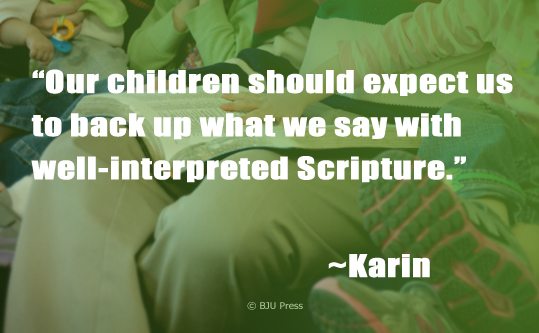In Part 1 of this series, we discussed the importance of family devotions. Now we will consider how you can implement family worship in your home. My husband and I picked up some ideas last year at a family worship workshop at our church, and this encouragement and instruction reignited our own time of family devotions. Reading scripture is a crucial element to effective family devotional times.

Each family has freedom on how to structure their worship time since there is no biblical mandate, but here are three elements you’ll probably want to include.
- Reading
- Praying
- Singing
What to Read—Scripture
What should you read? All kinds of devotional books are available, but it’s best to focus on the actual Word of God—from Genesis to Revelation. Telling your kids to trust God and treasure His Word, but then only reading children’s story Bibles or never reading more than the Proverbs or New Testament sends a conflicting message. How can they know God if their knowledge of Him is limited?
Why to Read Scripture—Some Reasons
The Bible has no parallel because no other book is inspired by God Himself (2 Timothy 3:16). No other book “is living and powerful, and sharper than any two-edged sword, piercing even to the division of soul and spirit” (Hebrews 4:12 NKJV). The Scriptures are life-giving, pointing to Christ: “From childhood you have known the Holy Scriptures, which are able to make you wise for salvation through faith which is in Christ Jesus” (2 Timothy 3:15 NKJV).
Teach children that God’s Word is to be trusted and man’s word doubted. Even our own hearts are deceitful (Jeremiah 17:9). We should always measure what we think, read, or hear by the Bible. Our children should expect us to back up what we say with well-interpreted Scripture (2 Timothy 2:15). When we ask them questions during Bible time, we occasionally follow up on their answers with, “How did you get that from the text?” In this way, we’re sharpening a biblical worldview and proper Bible interpretation.
How to Read Scripture—Some Suggestions
One family in our church had the goal of reading through the entire Bible. They made a timeline chart with a reward promised at the end. The kids would check off passages as they went, reminding each other if they were getting behind. When they successfully finished after about eighteen months, they had an ice cream party to celebrate, but everybody agreed that reading the Word all the way through would have been reward enough. Now this family is reading at a slower pace, picking different Old and New Testament books to study in depth.
Our family has been going through a reading plan called “100 Essential Bible Passages.” Since our children are younger, we’ve enjoyed hitting these highlights, and we plan to read them again in more detail at a later time.
At some point you may decide to go beyond reading and introduce your children to the three basic steps of biblical hermeneutics: observation, interpretation, and application. Help your children observe the text by asking questions about the “Five Ws” (who, what, when, where, and why). Their interpretation of a passage should not be based on “What does this text mean to me?” but “What does it mean?” Study with them so that they learn to discern what the writer was communicating to the original audience. Especially consider the context and relevant cross-references to compare Scripture with Scripture. For the application step, ask questions like, “How does this passage apply to our lives today?”
In Part 3, we will continue with the other two main aspects of family worship (praying and singing).
What have you found helpful when teaching your children about worship? How do you help them apply Scripture to their lives?
Leave a Reply